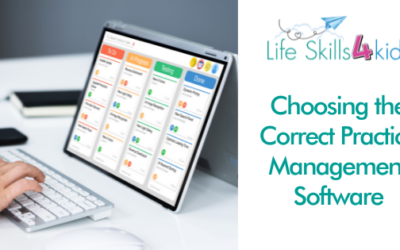With the arrival of Covid-19, many therapists have found themselves working from home. While that might be fun at first, it isn’t long before many people experience waning motivation or struggle with distractions.
You might have always wanted to attend a meeting in your pyjamas, but now you’re also surrounded by a house that needs cleaning, piles of laundry, or noisy family members. The idea of meeting online in comfort doesn’t always match the reality.
So, what can you do to stay motivated and productive?
Set a schedule and stick to it
A realistic routine is a foundation of working from home successfully. Whether you’re a social being who thrives on the company of others to do your best work or a workaholic who doesn’t know when to stop, a routine provides the structure you need to get through the day.
Start work at the same time each day, just as if you were going to a workplace. Schedule breaks and meals, and make sure you stop work at the same time. Having a routine helps to keep you from becoming distracted or working too hard.
Create a designated workspace
It’s important to have a space that you use for work. Sure, it might be convenient to move around the house with your laptop, but you’re far more likely to become distracted by other tasks that need attention or other people in your household.
There is also the psychological boundary that being “at work” in your workspace creates. It makes it possible to finish work and feel that you’re done for the day. This is crucial so you don’t feel as if you’re always on duty and allows you to take a mental break from work.
Limit interruptions and distractions
Who doesn’t love some attention from a pet or feel anxious when shouts break out from the other room?
If you’re working at home with children and pets, there are plenty of interruptions, and they can wreak havoc on your working day (not to mention digital distractions such as emails and notifications).
Plan activities for children ahead of time so that they have plenty to do and are less likely to want your attention. Schedule breaks to check up on them and establish some ground rules when it comes to interrupting you. Give them a time when you will be available and some appropriate reasons for interrupting you. (Blood? Robbers? Sure. Squabbles? No).
Work in time blocks
It’s important to block out time for tackling big tasks that might seem overwhelming. Allocating a certain amount of time to a task as well as planning what you do during that time will help to make it more manageable. You’ll be less inclined to procrastinate when you’ve given yourself a time limit and a goal for what you get done.
Use the 10-minute rule
If you really struggle with getting started on a task you don’t enjoy, try the ten-minute rule. Tell yourself that you’ll do ten minutes’ work on it, and then you qualify for a break.
You’ll often find that once you get started, you can keep going beyond the ten minutes because you’ve broken through the mental hurdle of beginning the task.
Set an incentive or reward
Many people respond well to rewards, so you can try setting a goal with a reward once you’ve achieved it. You might decide to get a certain amount of work done and then spend ten minutes on social media as you take a break. Or you aim to get all your work done by a certain time and then reward yourself with your favourite TV show. Our brains love rewards, and it can be very motivating to know that something enjoyable is waiting on the other side of work.
Create a challenge
Some people love the challenge of working with others, exploring new ideas and ways of doing things.
If you’re feeling bored or miss working with other people, set yourself a challenge. This might be to race the clock to write a certain number of words or finish a certain number of invoices or reports.
Pay attention to yourself while you work. Are you better at focusing first thing in the morning? If so, that’s the time to do the harder things you might struggle with later in the day. Do you type faster or more easily in a certain location? That’s the place to get through those reports quickly. Playing little games that engage your creativity or challenge your abilities can help motivate you to get through the day.
Stay connected
Many people miss interactions with their colleagues when they work from home. And a chat over Slack is not the same as getting together over lunch to brainstorm or vent about that situation that’s driving you both mad.
Organize regular online sessions with colleagues, or make sure you get involved with activities outside of work. Playing sports, attending play dates if you have kids, or joining a class to learn a new skill are all valuable opportunities for socialising, relieving stress, and reducing feelings of loneliness.
Practice emotional regulation
Many times, we avoid or put off tasks that make us feel uncomfortable. We just don’t want to face them or deal with them.
But there is always a reason why we feel uncomfortable about doing certain things, and it often pays to examine the emotion behind our discomfort.
Do you need to clean out that storage closet but you don’t want to face it? Perhaps you’re feeling overwhelmed – but why are you feeling overwhelmed?
Once you can work out what’s behind your emotions, you can work on strategies to help you deal with it. In the case of the scary storage closet, you might decide to use the 10 Minute rule on it, or set a reward for doing a certain amount of work in it.
Take care of yourself
When we work from home, we sometimes neglect our own health and wellbeing by working too much, not spending enough time outside, or not exercising as much as we should.
Being productive is dependent on how well we function, which is determined in part by the care we give ourselves. So we need to set aside time to get outside, get some exercise, eat well, and take time out to recharge. Our work benefits along with our health and quality of life.
Experiment with what works
There is no one-size-fits-all approach to staying motivated while you work from home. Experiment to find the best strategies that work for you, and don’t be afraid to share your experiences with others who might benefit from them.
THE KIDS OT POD GROUP SUPERVISION
Become part of a paediatric OT community and be supported professionally.
What’s Included in The Kids OT POD?
– The Kids OT POD is a membership-based group, giving you the ongoing support you so desperately need to run a successful OT practice.
– It also means you’ll be meeting the AHPRA requirements for CPD to keep your OT registration up-to-date.
– Join me on the rewarding journey to achieve more control over your work, life and caseload management to become the Kids OT you’ve always dreamed of.







